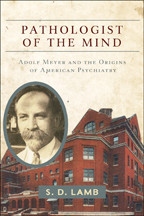
Reviews
Eigen has gone deeper than anyone to date in analysing the course of the insanity defence in English law. His trilogy is the go-to source for this fascinating and distressing topic.
An unlikely subject for vacation or bedtime reading? On the contrary, the ‘mad-doctors’’ task is unequivocally compelling. Eigen translates his extensive research clearly as a scientific rather than sensational exposition. Readers interested in criminal jurisprudence, the complexities of temporary insanity, and contemporary criminal procedure in light of the historical background will be fascinated.
From a historical perspective, the narrative is very interesting and easily flows. The work is highly recommended for undergraduates, graduate students in psychiatry and forensic medicine, and researchers in jurisprudence.
An excellent piece of historical scholarship: intrinsically interesting in subject matter, fully alive to the creative and analytical potential in attending to historical particularity, mindful of the lives that populate the often-tragic cases examined, and resolutely opposed to simplistic readings, Mad-Doctors in the Dock is a fitting conclusion to Eigen's assiduous search for the right question.
Eigen covers his territory in an informed, assured fashion.
Vital for understanding the development of the English trial... This book and the trilogy of which it is a part provide a major chapter in the history of the public sphere. Historians of law, medicine, and psychiatry will seek out Eigen's work, but the trilogy has much to offer scholars in Victorian studies more generally.
By bringing together legal and medical history, the book makes an important methodological contribution to historiographies that do not always engage each other directly. The analysis of interlocking medical and legal discourses and of the effects that they had on each other reveals that neither is an isolated system of thought. The book will be a valuable resource for scholars interested in the history of legal insanity as well as for those interested in broader questions related to responsibility.
Eigen exploits detailed courtroom narratives from the Old Bailey Sessional papers to give us a colorful and gripping sense of the life-and-death maneuvers involved in mounting an insanity defense. Placing forensic psychiatry into a much broader social, cultural, and intellectual context, Mad-Doctors in the Dock is an excellent, accessible, and well-written account.
From the crime scene through the trial, Mad-Doctors in the Dock connects for the first time the evolution of the insanity doctrine, the judicial management of the trial, and the place of medical practitioners' diagnoses of defendants within the administration of the criminal law. A wise and original work—both foundational and indispensable.
The product of close and careful research covering hundreds of trials, Mad-Doctors in the Dock brings to life the ideas, the actors, and the drama in the development of medico-legal diagnoses such as homicidal mania. A valuable resource for legal scholars and historians and sociologists of madness and crime.
Book Details
Preface
Introduction
Chapter 1. Nasty, Brutish, and Short: Criminal Trials before the Lawyer
Chapter 2. Delusion and Its Discontents
Chapter 3.When Practitioners Become Professionals: The Alienists’
Preface
Introduction
Chapter 1. Nasty, Brutish, and Short: Criminal Trials before the Lawyer
Chapter 2. Delusion and Its Discontents
Chapter 3.When Practitioners Become Professionals: The Alienists’ Claim to Knowledge
Chapter 4. The Diagnosis in the Dock
Chapter 5. The Witness Takes the Stand
Chapter 6. Homicidal Mania: Provenance and Cultural Context
Chapter 7. The View from the Bench: Judicial Discretion and Forensic-Psychiatric Evidence Conclusion. On the Origins of Diagnosis
Notes
Index





